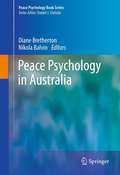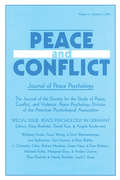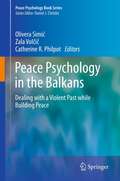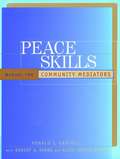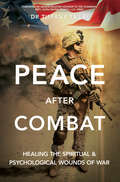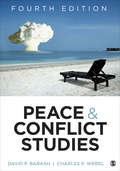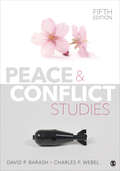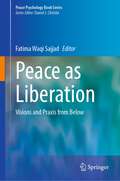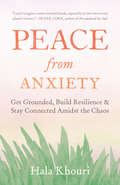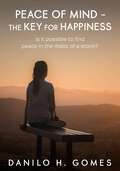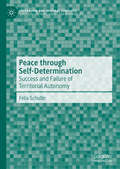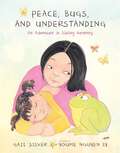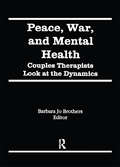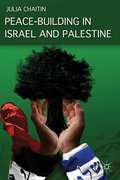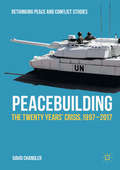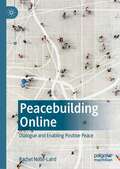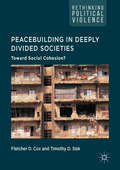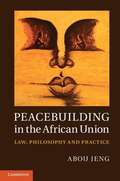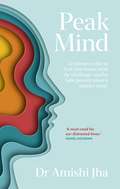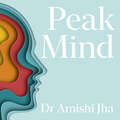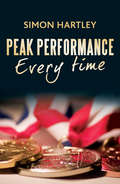- Table View
- List View
Peace Psychology in Australia
by Nikola Balvin Diane BrethertonThis book is a case study of the development of peace psychology in Australia. While there is, in comparison to other countries, relatively little overt violence, Australia the nation was founded on the dispossession of Indigenous people, and their oppression continues today. Peace Psychology in Australia covers the most significant issues of peace and conflict in the country. It begins with a review of conflict resolution practices among Australia's ancient Indigenous cultures and succinctly captures topics of peace and conflict which the country has faced in the past 222 years since British settlement. The fast population growth, thriving multiculturalism, leadership in international affairs and environmental isolation make Australia a microcosm for the study of human conflicts and peace movements.
Peace Psychology in Germany: A Special Issue of Peace and Conflict
by Klaus Boehnke Daniel Fuss Angela KindervaterFirst published in 2005. This is a special issue of Peace and Conflict, the Journal of Peace Psychology, Volume II, number 3 looks at Peace Psychology in Germany. The papers include old and new antisemitic attitudes, human rights, attitudes towards War, refugees, and results from a German Six-Wave, twenty-year study.
Peace Psychology in the Balkans
by Catherine R. Philpot Olivera Simić Zala VolčičThe volume covers the development of peace psychology in the Balkans. The Balkans is a region marked by post-communist and post-conflict transitional turmoil, and this book provides a comprehensive introduction to research in peace psychology in this part of the world, written by scholars primarily working in the Balkan area. It brings together innovative scholarship that examines interdisciplinary aspects of peace psychology researched and written by scholars from Kosovo, Serbia, Bosnia, Bulgaria, Romania, Macedonia, Croatia, and Slovenia as well as presenting research that responds to contemporary global issues by tracking the ways in which peace psychology is developing and implementing in the Balkans.
Peace Skills: Manual for Community Mediators
by Ronald Kraybill Alice Evans Robert EvansHow to be a "peacebuilder" and mediate between conflicted entities.
Peace after Combat: Healing the Spiritual and Psychological Wounds of War
by Dr. Tiffany TajiriIt could be your neighbor, your coworker, your son, or the woman sitting next to you in church. When combat veterans return from war, they&’re often confused. They struggle to reconnect with their families; the cheering crowds and smothering hugs make them want to jump out of their skin; and sometimes they even long to return to the hell of deployment. What they&’ve experienced in combat can radically change how they view themselves, others, and the world at large. They may have never seen so much hurt, suffering, death, and destruction, which leaves them questioning, &“Where is God?&” Dr. Tiffany Tajiri, a veteran USAF officer and board-certified clinical psychologist, has been in countless sessions with combat veterans and their loved ones and now shares powerful first-hand accounts, lessons, proven exercises, and biblical truth. Whether experiencing combat directly as a veteran or wanting to help bring healing as a family member, pastor, chaplain, or counselor, this book is essential. The emotional, psychological, and spiritual healing encountered applies to anyone facing harsh realities and uncomfortable questions and hoping to find peace again.
Peace and Conflict Studies
by David P. Barash Charles P. WebelThe thoroughly updated Fourth Edition of the gold standard text explores historical and current topics in today’s rapidly changing world to provide a comprehensive introduction to peace and conflict studies. Authors David P. Barash and Charles P. Webel offer an insightful analysis of 21st-century global affairs, including such timely topics as ISIS, the nature of violence and nonviolence, cutting-edge military technologies, the Terrorism and Global Peace Indexes, and the latest developments in Iran, North Korea, and Syria. Comprehensive yet written in a student-friendly and accessible style, the text represents a commitment to inspire readers to create a better world through an understanding of what has happened and what is happening, and therefore what is likely to take place in the future.
Peace and Conflict Studies
by David P. Barash Charles P. WebelPeace and Conflict Studies sets the standard for an accessible introduction, a comprehensive exploration, and analysis of 21st-century world events – including updated coverage of the COVID-19 pandemic, the Middle East, the Social Justice movements within the US, and Global Climate Change. The text examines current conflicts, explores the important aspects of positive peace, individual violence, nationalism, and terrorism, provides numerous visual aids, questions for further study, and suggested readings, and furnishes a comprehensive range of material to enlighten and enrich future discussion and encourage further academic pursuit. With a broad and authoritative scope, this introductory text chronicles a plethora of important global topics from pre-history to the present.
Peace and Conflict Studies
by David P. Barash Charles P. WebelPeace and Conflict Studies sets the standard for an accessible introduction, a comprehensive exploration, and analysis of 21st-century world events – including updated coverage of the COVID-19 pandemic, the Middle East, the Social Justice movements within the US, and Global Climate Change. The text examines current conflicts, explores the important aspects of positive peace, individual violence, nationalism, and terrorism, provides numerous visual aids, questions for further study, and suggested readings, and furnishes a comprehensive range of material to enlighten and enrich future discussion and encourage further academic pursuit. With a broad and authoritative scope, this introductory text chronicles a plethora of important global topics from pre-history to the present.
Peace and Conflict Studies (Conflict And Consciousness Ser. #Vol. 9)
by David P. Barash Charles P. WebelThe thoroughly updated Fourth Edition of the gold standard text explores historical and current topics in today’s rapidly changing world to provide a comprehensive introduction to peace and conflict studies. Authors David P. Barash and Charles P. Webel offer an insightful analysis of 21st-century global affairs, including such timely topics as ISIS, the nature of violence and nonviolence, cutting-edge military technologies, the Terrorism and Global Peace Indexes, and the latest developments in Iran, North Korea, and Syria. Comprehensive yet written in a student-friendly and accessible style, the text represents a commitment to inspire readers to create a better world through an understanding of what has happened and what is happening, and therefore what is likely to take place in the future.
Peace as Liberation: Visions and Praxis from Below (Peace Psychology Book Series)
by Fatima Waqi SajjadThis edited volume highlights a type of violence largely overlooked by peace psychologists; it explores ‘epistemic violence’ which refers to the silencing of the marginalized, racialized and colonized people in the process of knowledge production. This book celebrates the voices and the agency of the subalterns, honoring their visions, testimonies and struggles to push boundaries and create spaces for peace within oppressive environments. “Visions and Praxis from below” refers to peace visions and struggles of the people who live “below the vital ability of shaping the world according to their own vision”. It is a challenge to the hegemonic perspective that ‘credible’ thinking on peace can only be done by the people ‘from above’. This perspective will add to the understanding of not only peace psychologists, but all those who work toward social justice.
Peace from Anxiety: Get Grounded, Build Resilience, and Stay Connected Amidst the Chaos
by Hala KhouriA holistic approach to easing anxiety without hiding from the world's challenges.Overwhelming anxiety and stress--most of us experience these feelings at some point. The challenges in our lives threaten to overpower us at times and the struggles we see in the world further add to the burden. Peace from Anxiety helps us understand the deep roots of our suffering so that we can work toward finding more peace--even in chaos. Therapist and yoga teacher Hala Khouri takes us on a journey to investigate our personal habits, understand our lives, and transform what doesn't serve us. Even though the roots of our anxiety, stress, and pain may feel complicated, healing doesn't have to be.Khouri explores how our brain and nervous system experience stress and discusses how we can begin to get in touch with our body to better understand its signals and how to handle them. She delves deeply into the primary causes of anxiety and offers practical tools for releasing stress and being present with discomfort. Peace from Anxiety discusses topics including trauma, relationships, technology, and working not only for individual healing but also collective healing in our world. Filled with relatable stories and examples, each chapter offers a range of practices and tools to help us find more peace and work for good in our own lives and the lives of others.
Peace from Nervous Suffering
by Claire WeekesThis classic anxiety-relief guide from the author of Hope and Help for your Nerves has brought solace to over a quarter million readers coping with panic attacks and agoraphobia. Dr Claire Weekes offers clear, concise advice to anyone suffering from anxiety: FACE: DO NOT RUN ACCEPT: DO NOT FIGHT FLOAT PAST: DO NOT LISTEN IN LET TIME PASS: DO NOT BE IMPATIENT WITH TIME It may look much too simple, but if you can truly master these four important principles, you are already on your way to rapid recovery. Written in response to great demand from both the medical and psychological communities, as well as from her own devoted readers, Dr. Weekes's revolutionary approach to treating nervous tension is sympathetic, medically sound, and quite possibly one of the most successful step-by-step guides to mental health available.
Peace of Mind - The Key for Happiness: Is it possible to find peace in the midst of a storm?
by Danilo H. GomesPeace is possible. You only have to find it within your Self, where it already exists. Let's learn how to enjoy and use it. Human beings are prone to infinite development within their limitations. Bearing this in mind, I have to ask you this question." How many of your abilities are not being used?" Yes, you do have a lot of abilities which have been in "sleep mode". Most of them remain in silence and hidden in the depth of your brain waiting for something that can make them wake up. Inner peace is the trigger to make them rise and shine. We cannot buy peace as any other product or commodity. It's not for sale or negotiable. If you want to achieve it, you will have to put into practice some simple yet challenging actions, mainly due to the frantic pace current society demands from us. This book will help you move forward in your mental and physical development process. If you are willing to apply what you are about to learn, you will get ready to change the way you think and act for the better.
Peace through Self-Determination: Success and Failure of Territorial Autonomy (Federalism and Internal Conflicts)
by Felix SchulteBringing together comparative politics, conflict research and social psychology, this book presents a novel theory to explain the consolidation outcomes of post-conflict autonomy arrangements. It builds on Social Identity Theory and identifies a successful process of ethnic recognition as the key prerequisite for peaceful interethnic cohabitation through territorial self-governance. As this process is highly context-dependent, the study identifies relevant structural and actor-centered factors and analyzes their occurrence in the consolidation periods of nineteen autonomy arrangements worldwide using Qualitative Comparative Analysis (QCA). The author concludes that elites accept autonomy reforms if they promise a high degree of self-determination and, at the same time, ethnic recognition is not hindered by horizontal inequalities. Bargaining efforts succeed within inclusive institutions involving non-nationalist parties and international organizations. Autonomy reforms fail if the degree of self-rule offered is too low and strong inequalities generate new grievances. Autocratic rule, nationalist parties, and a lack of international attention provide a breeding ground for further centrifugal activities. In-depth case studies on South Tyrol and the Chittagong Hill Tracts provide further evidence for the theoretical models.
Peace, Bugs, and Understanding: An Adventure in Sibling Harmony (Anh's Anger Story)
by Gail Silver Youme Nguy?n LyLily and her little sister Ruby are having a picnic when Ruby spoils their game of checkers. Lily lashes out but soon gets absorbed in a wonderful book, the story of her great grandfather's encounter with a strange looking frog-like creature called Anger. The precious old journal teaches Lily about Metta, a technique that has helped people transform anger into loving kindness for thousands of years.With original watercolors by award-winning illustrator Youme Nguyen Ly, Peace, Bugs, and Understanding is an invaluable tool for parents and teachers, and will help children learn to understand the causes of their own strong emotions, while teaching them peaceful ways to resolve difficulties through mindfulness and meditation. and accepting accountability for their actions when appropriate. By learning these skills, children can grow comfortable with them and carry them into adulthood with ease and confidence.
Peace, War, and Mental Health: Couples Therapists Look at the Dynamics
by Barbara Jo BrothersDiscover how issues of world war and peace relate to the dynamics of couples therapy in this thought-provoking book. In Peace, War, and Mental Health, couples therapists provide diverse views on the links between strengthening marriages and preventing and solving international disputes. Although the contributors vary in their approaches to this issue, a common theme is the belief that couples as well as countries need to build bridges, not walls, for healthy relationships and they need to strive to learn what others are really feeling, thinking, or needing underneath the defenses others exhibit.The contributing therapists in Peace, War, and Mental Health explore the various links between couples in conflict and nations at war. Chapters describe how prevention strategies used for couples in therapy may be applied to the well-being of the world as a whole and how significant change is possible through the involvement of only a small percentage of the population. Other chapters focus on specific tools for couples therapy such as outlines of the major tasks of relationship building and traps that mitigate against good relationship construction, a description of the nuts and bolts of conflict resolution, and the use of flashcards to help both members of the pair present his or her real feelings to the other. Some of the intriguing topics covered in this book include: the relationship between psychotherapy and spirituality and the paradox of individuals longing to belong since each is a part of the whole the role of gender on war and its potential impact on peace the failure of the humanistic movement societal attitudes linking domestic violence and large scale violence how the potential for resolution of differences in couples can be applied to peace among nations how prevention may be expanded to include the “mental health” of the whole world--Part V of an interview with Virginia SatirPeace, War, and Mental Health helps therapists look at international peace and couples therapy with new perspectives, a necessity in today’s rapidly changing family and world climate.
Peace-Building in Israel and Palestine
by Julia ChaitinThis book presents an overview of psycho-social research on the Israeli-Palestinian conflict, presents and analyzes people-to-people activities in the region, and offers new conceptualizations for Israeli-Palestinian co-creation of a grassroots peace and social justice processes.
Peacebuilding
by David ChandlerMoving beyond the binary argument between those who buy into the aims of creating liberal democratic states grounded in free markets and rule of law, and those who critique and oppose them, this timely and much-needed critical volume takes a fresh look at the liberal peace debate. In doing so, it examines the validity of this critique in contemporary peacebuilding and statebuilding practice through a multitude of case studies - from Afghanistan to Somalia, Sri Lanka to Kosovo. Going further, it investigates the underlying theoretical assumptions of liberal peacebuilding and statebuilding, as well as providing new theoretical propositions for understanding current interventions. Written by some of the most prominent scholars in the field, alongside several new scholars making cutting edge contributions, this is an essential contribution to a rapidly growing interdisciplinary area of study.
Peacebuilding Online: Dialogue and Enabling Positive Peace
by Rachel Nolte-LairdThis study takes the work of transforming violence and conflict online and offers insight into the practice of dialogue in virtual settings for peacebuilding purposes. In the field of peace and conflict studies and peacebuilding practices, a significant amount of literature has dealt with the theory and practice of dialogue in face-to-face settings. This project is unique as it takes the peacebuilding practice of dialogue and explores it within an online context. The research is framed and analyzed through the dialogue theories of Martin Buber and Paulo Freire. This project is distinct in its exploration of the connection between dialogue encounters and positive peace, the practical linkages of which are often difficult to articulate or identify. As such, this book offers unique contributions to the knowledge and understanding of dialogue-based peacebuilding in online settings and provides an understanding of how dialogue practices enable outcomes within the construct of positive peace. This book is aimed at academics as a presentation of research into a relatively unexplored field of inquiry. However, it is also relevant and applicable for peacebuilding practitioners who want to navigate taking their practices into online settings and provide a framework for linking practices to intended positive peace outcomes.
Peacebuilding in Deeply Divided Societies
by Timothy D. Sisk Fletcher D. CoxThis book explores a critical question: in the wake of identity-based violence, what can internal and international peacebuilders do to help "deeply divided societies" rediscover a sense of living together? In 2016, ethnic, religious, and sectarian violence in Syria and Iraq, the Central African Republic, Myanmar, and Burundi grab headlines and present worrying scenarios of mass atrocities. The principal concern which this volume addresses is "social cohesion" - relations within society and across deep divisions, and the relationship of individuals and groups with the state. For global peacebuilding networks, the social cohesion concept is a leitmotif for assessment of social dynamics and a strategic goal of interventions to promote resilience following violent conflict. In this volume, case studies by leading international scholars paired with local researchers yield in-depth analyses of social cohesion and related peacebuilding efforts in seven countries: Guatemala, Kenya, Lebanon, Nepal, Nigeria, Myanmar, and Sri Lanka.
Peacebuilding in the African Union
by Abou JengParticularly in the context of internal conflicts, international law is frequently unable to create and sustain frameworks for peace in Africa. In Peacebuilding in the African Union, Abou Jeng explores the factors which have prevented such steps forward in the interaction between the international legal order and postcolonial Africa. In the first work of its kind, Jeng considers whether these limitations necessitate recasting the existing conceptual structure and whether the Constitutive Act of the African Union provides exactly this opportunity through its integrated peace and security framework. Through the case studies of Burundi and Somalia, Jeng examines the structures and philosophy of the African Union and assesses the capacity of its practices in peacemaking. In so doing, this book will be of great practical value to scholars and legal practitioners alike.
Peaceful Mind: Using Mindfulness & Cognitive Behavioral Psychology to Overcome Depression
by John R. Mcquaid Paula E. CarmonaThe use of mindfulness practice and cognitive behavior therapy in treating depression.
Peak Mind: Find Your Focus, Own Your Attention, Invest 12 Minutes a Day
by Amishi Jha'This book can catapult you into living fully the life that is yours to live while you have the chance' Jon Kabat-Zinn'A must-read for our distracted times' Dan Goleman'A must-have guide to experiencing every moment of our lives' Goldie Hawn'A treasure trove of insights and exercises to enrich our lives' Dan SiegelStop for a moment. Are you here right now?Is your focus on the words in front of you? Or is it roaming elsewhere, to the past or future, to a worry, to your to-do list, or to your phone?The good news: There's nothing wrong with you - your brain isn't broken. The human brain was built to be distractible.The even better news: You can train your brain to pay attention more effectively.Acclaimed neuroscientist Dr Amishi Jha has dedicated her life's work to understanding the science of attention at every level - from brain imaging studies in the lab to field testing soldiers, firefighters and athletes. Her mission has been to scientifically determine how we can harness the full power of our attention to better meet all that life demands. In Peak Mind, Dr Jha expertly guides readers through fascinating research, debunking common assumptions about focus and attention, and offers remarkably easy-to-adapt flexible twelve minute-a-day exercises to lift the mental fog, declutter the mind, and strengthen focus so that you can experience more of your life.
Peak Mind: Find Your Focus, Own Your Attention, Invest 12 Minutes a Day
by Amishi Jha'This book can catapult you into living fully the life that is yours to live while you have the chance' Jon Kabat-Zinn'A must-read for our distracted times' Dan Goleman'A must-have guide to experiencing every moment of our lives' Goldie Hawn'A treasure trove of insights and exercises to enrich our lives' Dan SiegelStop for a moment. Are you here right now?Is your focus on the words in front of you? Or is it roaming elsewhere, to the past or future, to a worry, to your to-do list, or to your phone?The good news: There's nothing wrong with you - your brain isn't broken. The human brain was built to be distractible.The even better news: You can train your brain to pay attention more effectively.Acclaimed neuroscientist Dr Amishi Jha has dedicated her life's work to understanding the science of attention at every level - from brain imaging studies in the lab to field testing soldiers, firefighters and athletes. Her mission has been to scientifically determine how we can harness the full power of our attention to better meet all that life demands. In Peak Mind, Dr Jha expertly guides readers through fascinating research, debunking common assumptions about focus and attention, and offers remarkably easy-to-adapt flexible twelve minute-a-day exercises to lift the mental fog, declutter the mind, and strengthen focus so that you can experience more of your life.
Peak Performance Every Time
by Simon HartleyPeak performances should not be left to chance. Rather than hoping that you will perform at your best, why not engineer your performance? Peak Performance Every Time incorporates principles from sport psychology and performance coaching and applies these to all areas of life. Using illustrations and real-world examples from top athletes and business executives, it focuses on the three main components that underpin performance: Confidence Motivation Focus. As well as offering practical strategies to help the reader achieve their optimal mindset, it also explains how to coach others to perform to their potential. Throughout, the book is underpinned by theoretical frameworks, literature and research findings and will be invaluable to anyone trying to reach their full potential, in particular athletes, coaches, managers and executives. It may also be of interest to sports psychology, management and business students.
